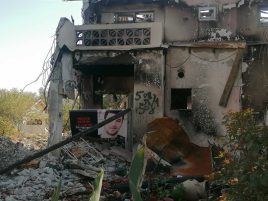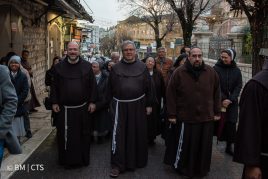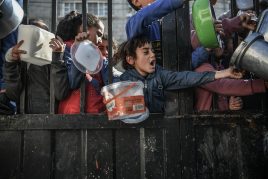
Hamas attacked Israel exactly one year ago, on the 7th of October 2023. Thousands of members of Palestinian terrorist groups from the Gaza Strip infiltrated Israeli territory by land, sea and air, killing 1,200 Jews, including civilians and soldiers, heinously slaughtering men, women, children and the elderly living in kibbutzim and towns near the border, including Sderot.
 That same day, 250 people were taken hostage; 101 of them (as of 26 September 2024, ed.’s note), representing no fewer than 21 nationalities, are still being held by Hamas. The State of Israel had a rude awakening: in the space of a few hours, its long-held security myth was shattered. Israel responded with a military campaign in Gaza that has so far claimed over 41,500 Palestinian lives, left over 96,000 wounded, and caused the destruction of entire neighbourhoods, including roads, schools, hospitals, and various infrastructure. The entire population of Gaza, which has been internally displaced, is facing a full-blown humanitarian and health emergency. Negotiations mediated by the US, Qatar and Egypt to achieve a ceasefire and the release of hostages have so far proved inconclusive. On the one-year commemoration of 7 October, SIR interviewed the Custos of the Holy Land, Father Francesco Patton.
That same day, 250 people were taken hostage; 101 of them (as of 26 September 2024, ed.’s note), representing no fewer than 21 nationalities, are still being held by Hamas. The State of Israel had a rude awakening: in the space of a few hours, its long-held security myth was shattered. Israel responded with a military campaign in Gaza that has so far claimed over 41,500 Palestinian lives, left over 96,000 wounded, and caused the destruction of entire neighbourhoods, including roads, schools, hospitals, and various infrastructure. The entire population of Gaza, which has been internally displaced, is facing a full-blown humanitarian and health emergency. Negotiations mediated by the US, Qatar and Egypt to achieve a ceasefire and the release of hostages have so far proved inconclusive. On the one-year commemoration of 7 October, SIR interviewed the Custos of the Holy Land, Father Francesco Patton.
What has changed in Israel since 7 October?
The way of life and the way of living together underwent a radical transformation. Before 7 October, there was a balance – albeit a delicate one – of coexistence, with a positive and open attitude towards the Palestinian world in certain sectors of Israeli civil society, and vice versa. What happened on 7 October turned back the hands of time to the period preceding 1948, the year of the establishment of the State of Israel, but with a proliferation of hatred, anger, fear, polarisation and even a refusal to reason in today’s culture and public discourse. There is an obvious refusal to consider the future impact of the present actions.
 Is it even possible to put the ‘pieces’ back together again in a society like Israel’s, traumatised by the events of 7 October?
Is it even possible to put the ‘pieces’ back together again in a society like Israel’s, traumatised by the events of 7 October?
It has to be said that Israel is home to a very diverse population, both religious and non-religious. There are some religious parties that support the government politically. Others less so. There are clergy with whom we engage in fruitful dialogue and others with whom this is not possible. Then there are the settlers, who are religiously and politically fundamentalist, causing a short-circuit resulting in a new form of nationalist messianic fundamentalism. It must also be said that the ultra-orthodox, also known as haredim, are not to be confused with the settlers, holding different positions vis-à-vis the Israeli government. In addition, as mentioned earlier, there are secular groups within Israeli society that are more open to dialogue with both Palestinians and ethnic Arab Israelis. In my humble opinion, any attempt to piece together the shattered fragments of this society requires a major change of mentality, which presupposes an openness to the other side and a belief that it is possible to establish mutual trust, dialogue, coexistence and acceptance.
 How can we empower this cultural transformation?
How can we empower this cultural transformation?
“Change comes from recognising each other’s suffering,” said Rachel Goldberg-Polin, the mother of Hersh, one of the hostages killed by Hamas while held in Gaza. Israelis and Palestinians need to understand each other’s suffering, which means recognising each other’s right to exist, their dignity.
The obstacle is of a cultural, psychological and, to some extent, religious nature, which, if not overcome, will ultimately hinder, if not prevent, coexistence. It is up to the political and religious leaderships of the two peoples to promote the overcoming of this obstacle. Unfortunately, at the moment, the desire to eliminate the other seems to be the only prevailing desire on both sides.
What happened on 7 October 2023 shattered the myth of Israel’s security…
Even before that, there was fear and insecurity. The large red billboards warning Israelis not to enter the Palestinian territories for security reasons, placed near military checkpoints, are evidence enough. It shows that the relations with the Palestinians were always characterised by mistrust and fear. I would rather call it a “fake feeling of security”, exacerbated by the wall that separates Israel from the West Bank and Gaza, and by the belief that Hezbollah could be monitored by the military on the border with Lebanon. In my view, the notion of fear is part of the collective unconscious of the Jewish people, and it has historical roots. The above-mentioned change, clearly outlined by Rachel Goldberg-Polin and the family members of other hostages held by Hamas, should equally involve this aspect. Unfortunately, I have the impression that at the moment a large part of Israelis back the government’s military operation, perhaps also out of a desire for revenge and deterrence, based on the fear of the enemy, in the hope that this will be enough to stop it. In reality, however, this only serves to fuel the anger that is bound to erupt into violence sooner or later. Just look at what is happening in Gaza. A fear-driven peace is tantamount to no peace at all.
 How widespread is fear among the two peoples in the current circumstances?
How widespread is fear among the two peoples in the current circumstances?
There is a widespread sense of fear among Jews, Muslims and Christians. The latter experience feelings of frustration, helplessness and vulnerability in the face of the many challenges brought about by the war, including unemployment and the rise of mafia-style organised crime within the Arab community, which is inadequately dealt with by the Israeli police and security forces. An atmosphere of fear pervades Gaza, the West Bank, northern Israel and Lebanon. In Lebanon, the friars of the Custody are concerned that they may be targeted by the Israeli military because of their work in providing shelter to displaced Lebanese who have lost their homes and possessions. People’s lives are permeated by widespread fear. I would like to make another comment.
Please do…
As the conflict along the border with Lebanon has intensified, Gaza is no longer in the news. The conflict and its enormous human toll – death, destruction and hate – have disappeared from the headlines. A similar phenomenon is occurring in the West Bank, where Israeli military strikes continue. This phenomenon is characteristic of contemporary news media: today we focus on Lebanon, tomorrow we will see. The news is also subject to the logic of sensationalism, and public opinion follows the news not in order to be informed, but as spectators once watched gladiators kill each other in the Colosseum. The result is the degradation of humanity.
How do you view the international community’s efforts over the past year to find a solution to the ongoing conflict in Gaza?
The international community appears to be impotent in its efforts to put pressure on the warring parties to cease military action and reach a negotiated solution. Western and Arab countries are also demonstrating their own incapacity. In fact, they continue to fuel and finance the conflict. Unless the flow of money is cut and the supply of weapons stopped – as Pope Francis has so often said, unheeded – it is very unlikely that the conflict will end. In my opinion, the international community has revealed its impotence and the absence of sincere and firm determination.
 What do you think of the contribution made by religious faiths? Let us not forget that the Holy Land is the cradle of the three great Abrahamic faiths, Judaism, Christianity and Islam.
What do you think of the contribution made by religious faiths? Let us not forget that the Holy Land is the cradle of the three great Abrahamic faiths, Judaism, Christianity and Islam.
Religions have not proved to be very helpful, especially in terms of their ability to successfully effect a cultural transformation in society. The religious leaders should stop justifying the religious use of violence. There needs to be a serious reinterpretation of the violence embedded in the sacred scriptures of Jews, Christians and Muslims in the light of the compassion that is the central and common denominator of the religious message of the Old and New Testaments as well as that of the Koran. If we fail to do this, the holy texts will continue to be used to justify acts of violence, as is happening today.
How can this dangerous course be reversed?
The way forward could be a new, multilateral Abu Dhabi document. It would not be signed by a Catholic Pope and a Sunni Imam, but by the main Christian, Jewish and Muslim leaders. However, this text would ultimately have to serve as a teaching and catechetical tool to reach believers from all walks of life. At present, the only leader capable of setting this process in motion is Pope Francis. As Christians, we must and should work hard to promote mutual trust, coexistence, dialogue and acceptance. These are small but highly significant prophetic signs. There is a saying in the Middle East that people planting strawberries think of the next season and people planting dates think of the next generation: we must be concerned about the next generation and commit ourselves to a long-term journey of sowing and cultivating a culture of mutual trust, reconciliation and coexistence if we want the next generation to reap the fruits of peace.












